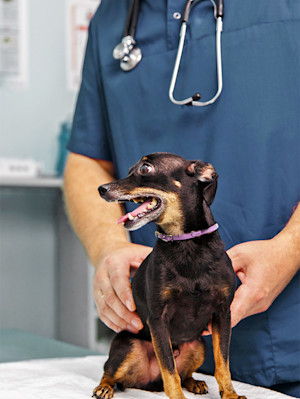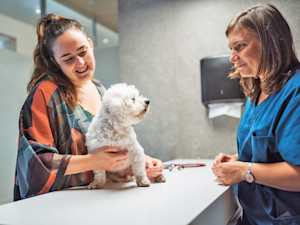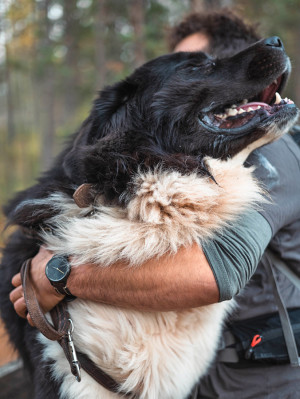How Much Do Puppy Vaccinations Cost in the UK?
Make sure to factor these crucial costs into your puppy budget
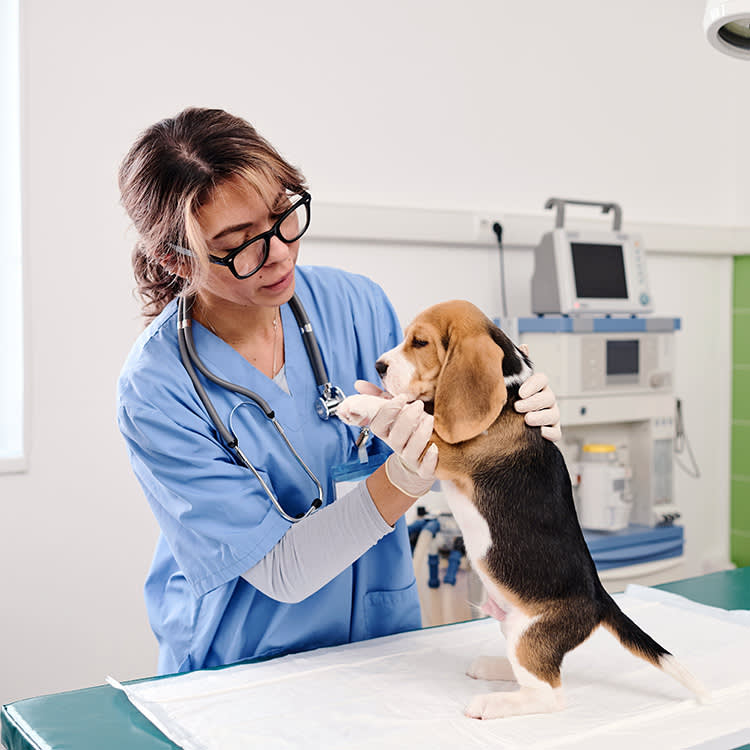
Share Article
If you’re looking into getting (or have just got a) puppy, congratulations! This is a very exciting time, and trying to get all the information about how to care for your new pup can be daunting. One of the most important aspects of becoming a pet parent is keeping our pets safe with vaccinations.
So that you can factor them into your new monthly costs (vaccinations definitely come before that fetching Barbour dog coat that doesn’t fit them yet, sorry) we’ve put together a guide on how much puppy vaccinations cost in the UK, along with all the info you need on why they are necessary and how you can keep costs down.

littleKin™ is Kinship’s home just for puppy and kitten parents. Bop over to check out expert advice, new pet tools, and special deals—all curated for your newest family member.
opens in a new tabCost of puppy vaccinations in the UK
The cost of puppy vaccinations is influenced by a number of things, including:
Location
The average cost of puppy vaccinations are between £40-£70 but can be £150+ depending on where you live and whether you and your vet decide on optional additional injections. This price could also be more if your pet is not registered with the practice.
It is important to search your local area to find the most suitable vet practice for you and your pet. While most general practices offer similar services, each has slightly different costs, opening times and cover. Some practices cover overnight and weekend emergencies and some use a partner practice at a different location. Some practices also offer service packages such as ‘puppy packs’, which cover the initial course of vaccinations and sometimes other benefits such as parasite cover. Some vet practices offer annual healthcare plans which include vaccinations, the price of which may be reduced if you have more than one petopens in a new tab.
Type of vaccine
The normal vaccinations your puppy will get in the UK are core vaccinations to protect against a variety of diseases including:
distemper
infectious canine hepatitis
There is also a non-core option of Bordetella and parainfluenza, usually termed the ‘kennel cough’ vaccination. If your puppy is travelling overseasopens in a new tab it is a legal requirement to also have the rabies vaccination, thankfully currently the UK is rabies free.
Where the vaccine is administered
It can be stressful taking your young puppy into the vets for the first time, but let me tell you it makes our day as vets seeing young healthy pups coming in. Every effort is put in place to make their first vet visitopens in a new tab a positive one – after a gentle introduction (usually with a treat or two!), your vet will do a clinical exam to make sure your pup is in good health and check for any underlying conditions. If for any reason your pup is under the weather when it’s time for vaccinations, they are usually put on hold until your pup is well again.
The core vaccinations are then mixed together into a syringe, meaning fewer injections for your pup. The injection is then given under the skin – usually over the back of the neck where there’s loose skin at the scruffopens in a new tab. If it is advised your pup needs the kennel cough vaccination, depending on age and individual risk, this can come as injection or in aerosol form, which is a very small amount of liquid squirted gently up their nose.
Set of vaccines
Puppy vaccinationsopens in a new tab are a set of two or three vaccinations given with 2–4 week gaps starting when your pup is 6–8 weeks old. The decision of two or three jabs depends on the exact age of your pup as maternally derived antibodies in very young pups may limit the effect of the vaccination, along with the specific brand of vaccination’s recommended protocol.
Remember, your pup is not fully covered until a week after their second injection, so it‘s important not to mix with other dogs or go for a walk where other dogs have been. Ideally you should carry your pup outside of your home or garden to limit the risk.
Why are vaccines important?
Vaccinations reduce the risk and the severity of illness to a variety of contagious diseases, some of which can be fatal. Vaccinations can also provide herd immunity; when a proportion of a population are vaccinated or immune against the disease, it protects those who are vulnerable by limiting spread of disease.
The vaccinations we give our puppies are against a set of diseases that can make them severely ill, and can be fatal:
Distemper, which is viral. It has become rare through vaccinations but it has a mortality rate of 50 percent in dogs and 80 percent in puppies.
Infectious canine hepatitis. This virus mainly affects the liver but also spleen, kidneys and eyes. There is no cure and only symptomatic treatment available. Even if survived, it can result in lifelong liver and kidney issues.
Parvovirus. This virus is common in young puppies causing severe vomiting and diarrhoea leading to dehydration and is often fatal, treatment is intensive supportive care.
Leptospirosis, which is bacterial. Known as Weil’s disease in humans, who are usually infected through rodent urine contaminated water sources. The UK has had increased cases in dogs over the last few years, symptoms vary from mild to severe and at the start can resemble other illnesses with vomiting and diarrhoea.
The majority of these diseases are viral, meaning antibiotics will not treat them. Antibiotics can only help treat the secondary bacterial infections that attack our pups while their immune system is lowered by disease. Not only are vaccinations important so our pups don’t fall ill, the treatment involved with these diseases if they do get them include intensive supportive care and sometimes lifelong, ongoing treatment which can be expensive and emotionally draining to families.
Should all puppies be vaccinated?
Generally, all puppies should be vaccinated to protect them and others from the spread of these diseases, however there are some situations where vaccinations are not recommended. For example; if your pup has any vomiting or diarrhoea when they are due their vaccinations it may be advisable to wait until this has resolved and any treatment has finished so we don’t overwhelm their immune system. If you plan to travel abroad with your puppy it is a legal requirement to have the rabies vaccination, so talk to your vet to discuss which vaccinations are most suitable for your pup.
How to save on puppy vaccinations in the UK
One way to save on puppy vaccinations is making sure you are registered with the practice beforehand. Most practices will also offer a variety of healthcare plan options or puppy care bundles including vaccinations, microchip placement and first parasite treatments. It is also a good idea to look locally for vaccination offers and clinics where appointments are shorter and cheaper if just for vaccinations. There are also charities or lower cost practices such as the Blue Crossopens in a new tab and PDSAopens in a new tab where more affordable healthcare options are available.
Puppy vaccination cost in the UK: frequently asked questions
How much is a puppy’s first vaccination?
Typically the cost of a puppy’s first vaccination is between £40–70 but this can increase if you have extras, such as a full primary course with microchip placement, first parasite treatment or having the optional kennel cough vaccination.
How much time does it take to vaccinate a puppy?
The vaccination injection itself is very quick, but before giving the injection, a full clinical exam is done to make sure your puppy is healthy and well enough for the vaccination. This should only take around 5–15 mins and it’s a great time to chat with your vet about how your pup is settling in and any concerns you have. It also allows your pup time to relax and get some cuddles and treats from your vet to make their first vet visit a positive one.
How many shots do puppies need to be fully vaccinated?
Puppies have a primary vaccination course of 2–3 injections spaced out by 2–4 week intervals starting from 6��–8 weeks old. Timing depends on the exact age of your pup and which vaccinations they have.
References
“ Canine Distemper | Cornell Wildlife Health Labopens in a new tab.” Cornell.edu, 4 Nov. 2016. Accessed 7 Jan. 2025.
VMD Position Paper on Authorised Vaccination Schedules for Dogsopens in a new tab. Accessed 7 Jan. 2025.
Lunn, Katharine F. “ Leptospirosis in Dogsopens in a new tab.” MSD Veterinary Manual, 8 Feb. 2022. Accessed 6 Jan. 2025.
Vet Times. “ Vets Warned of Big Increase in Lepto Casesopens in a new tab.” Vet Times, 2024. Accessed 6 Jan. 2025.
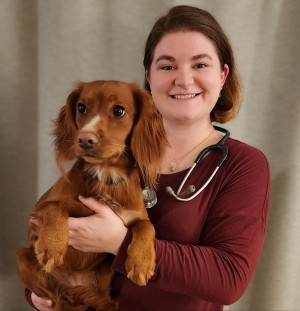
Dr Josephine Corrick, BVMSci, BSc, MRCVS
Dr Josephine Corrick, BVMSci, BSc, MRCVS is a veterinary surgeon based in the south of Scotland where she has been since graduating from the University of Surrey. She enjoys working in general practice treating small animals. Her particular interests include diagnostic imaging and the treatment of wildlife.
Having found a passion for veterinary medicine after doing a degree in Equine Sports Science she still enjoys including horses in her life by spending time with her highland ponies. Alongside her clinical work, she helps run a smallholding caring for rare breed sheep and exploring the Scottish countryside with her young Cocker Spaniel.
Related articles
![a woman with curly hair smiles down at her daschund]() opens in a new tab
opens in a new tabHow Much Does it Cost to Have a Dog?
We got our paws on a calculator and did the research so you don’t have to
- opens in a new tab
How Much Does It Cost to Spay a Dog in the UK?
The lowdown on spaying costs in the UK
![]() opens in a new tab
opens in a new tabHow to Find Free Dog Neutering in the UK
Struggling with the cost of neutering? These places can help
![Newfoundland dog in the arms its owner]() opens in a new tab
opens in a new tabThe Most Expensive Dog Breeds to Insure (How to Reduce Your Pet Insurance Premium)
How to get that insurance premium down (without sacrificing your pup’s health)
![woman hugging dog]() opens in a new tab
opens in a new tabWhere to Get Help If You’re Struggling to Afford Your Pet
If you’re struggling with pet care costs, you are far from alone and there’s no shame seeking help. Here’s a few places to start
![a man smiles at a fluffy white dog in a pet food store]() opens in a new tab
opens in a new tabPet Food Banks Can Help If You’re Struggling to Feed Your Pet
Plus, how to donate to pet food banks to help other pet parents in need
